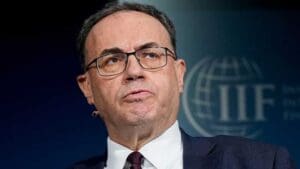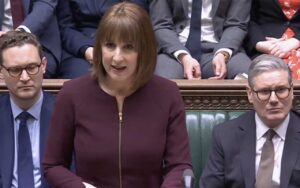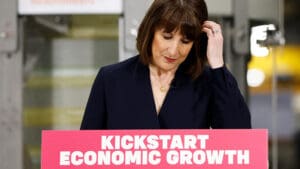The governor of the Bank of England, Andrew Bailey, has issued his starkest warning yet about the long-term impact of Brexit, saying that the economic consequences of Britain’s exit from the European Union will remain “negative for the foreseeable future.”
Speaking in Washington DC to a gathering of global central bankers, Bailey said he was not commenting on Brexit as a political issue but as a matter of economic fact.
“It’s my job as a public official to implement the decision taken by the people of the UK,” he said. “But if you ask me what the impact is on economic growth, I do have to answer that question — and the answer is that, for the foreseeable future, it is negative.”
“Over the longer term,” he added, “there should be a positive, albeit partial, counterbalance as the economy adjusts.”
The comments represent the clearest acknowledgment to date from the Bank that the UK’s departure from the EU continues to weigh on output, productivity, and trade.
Bailey said Brexit had reduced the openness of the British economy, restricting growth potential even as businesses adapted to new trading conditions.
“Make an economy less open and it will restrict growth,” he said. “Though over a longer time, trade will adjust and rebuild — and this appears to be what has happened.”
He likened the UK’s experience to global trade tensions caused by new US tariffs, including the sweeping duties recently imposed by President Donald Trump on multiple countries. “The same argument holds for the world economy and tariffs,” Bailey said.
His remarks came as the Bank continues to weigh the timing of potential interest rate cuts amid persistent inflationary pressures and subdued growth.
Chancellor Rachel Reeves has also cited Brexit as a key factor behind the UK’s economic difficulties and the “tight fiscal backdrop” facing her 26 November budget.
In a recent interview with Sky News, Reeves said: “There is no doubting that the impact of Brexit is severe and long lasting. People thought the UK economy would be 4 per cent smaller because of Brexit.”
That figure echoes projections from the Office for Budget Responsibility (OBR), which estimated that the UK’s departure from the EU would reduce long-term output by around 4 per cent compared with remaining inside the single market.
Reeves is reportedly exploring both tax rises and spending cuts to meet her fiscal rules while addressing what she describes as “the inheritance of a weak economy.”
While Bailey did not specify which areas of the economy have been most affected, the Bank has previously noted that Brexit has disrupted trade in goods and services, constrained investment, and lowered labour supply.
He suggested, however, that the UK could eventually rebuild new trading relationships and partially recover from the shock. “Over time, trade adjusts,” he said, “but it takes years, not months.”
Bailey also warned that slower post-Brexit growth had made the government’s fiscal choices harder, explaining that if the UK economy had grown by 2.5 per cent annually over the past 15 years — rather than 1.5 per cent — the debt-to-GDP ratio would stand at 82 per cent, instead of the current 96 per cent.
“If the denominator grows more slowly,” he said, “economic policymaking gets more difficult.”
In a wide-ranging address, Bailey also touched on the economic potential of artificial intelligence, warning that it could simultaneously drive innovation and pose new risks to financial stability.
“There is nothing inconsistent with thinking that AI is the next big technology and being concerned that it may challenge financial stability through stretched valuations, particularly in an environment of larger global supply shocks,” he said.
Bailey’s predecessor Mark Carney, now prime minister of Canada, drew similar scrutiny ahead of the 2016 referendum when he warned that leaving the EU could tip Britain into recession. While Carney’s remarks were attacked by pro-Brexit politicians, Bailey’s intervention — nearly a decade on — suggests the economic cost of the UK’s decision to leave the bloc remains a defining issue for both monetary and fiscal policy.


















